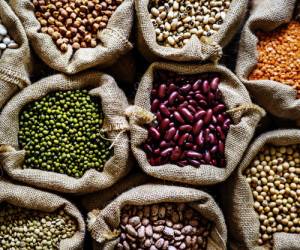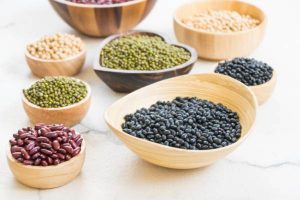An important reason to eat legumes constantly !!
Legumes are one of the best sources of protein and have a high nutritional value after animal protein. On the other hand, they are a cheaper source of protein and can be a good alternative for those who can not afford meat. Of course, everyone in the world should include legumes in their diet with diet.
People who want to eliminate animal protein or balance their meat and vegetable intake should add legumes to their diet. The quality of protein obtained from legumes is lower than that of beef. The amount of amino acids in legumes is also lower.
Of course, if the amount of legumes consumed is different, a complete amino acid will reach the body. Different cultures worldwide have their way of consuming legumes, and each of them stores a type of legume in their diet; for example, some of them use beans, peas, lentils, rice, and so on.
All legumes have high nutritional value, including beans, protein, folic acid, and fiber. When you add beans to your diet, you may experience bloating or indigestion, which you can reduce by cooking beans. Of course, among other legumes, beans are easier to digest.

Benefits of legumes in the diet:
Protein
Beans are rich in amino acids. Amino acid is a nutrient for protein production, promotes hair growth, skin and nail beauty, and provides energy. Improves metabolic reactions and overall health of hormones and the immune system.
Fiber
Fiber is an indigestible carbohydrate that makes a person feel full, helps digest food, removes excess material from the body, regulates blood sugar, and lowers cholesterol. The fiber in legumes is great for people with diabetes, hypoglycemia, or insulin resistance.
Folate or folic acid
One of the most important nutrients for the normal division of cells during pregnancy is breastfeeding, folic acid, or vitamin B9, which plays a very effective role in the baby’s growth. Young people should also get enough of this vitamin to have a proper metabolism. It has a lot of energy and increases the production of red blood cells. Folic acid is effective in reducing heart attacks, strokes, and vascular diseases.
Iron
Iron is also an essential mineral that carries oxygen from blood cells to other body parts and helps increase energy levels and endurance.
Thiamine or vitamin B1
Thiamine or vitamin B1 plays an active role in carbohydrate metabolism, converting it into usable energy. This vitamin can also improve a person’s nervous function and convert ketones into coenzymes needed for cellular metabolism.
Manganese
Manganese is also responsible for producing and maintaining sex hormones, blood sugar regulation, nerve, and brain function, regulation, and absorption of calcium, and is also effective in carbohydrate metabolism and plays an important role in cartilage and bone health.
magnesium
Magnesium increases cardiovascular health, improves muscle activity and relaxation, energy production, and bone health.
Antioxidants
The legume antioxidants fight free radicals associated with aging, cancer, diabetes, and cardiovascular disease.

Make the most of the benefits of legumes:
Eat three or more cups of legumes a week to get all the vitamins, minerals, and nutrients your body needs.
Save time. Cooked beans can be frozen for six months. So take some of it and put it in the freezer to melt if needed and use it easily.
You can easily add legumes to your diet. Many people complain that they do not know how to eat legumes with their diet, but various foods can be used in legumes for minutes to hours. If you use the frozen bean method, you can have a great meal with beans in a few minutes.
Legumes can be effective in treating the following diseases:
Diabetes
Legumes are plant-based and contain nutrients to reduce the risk of type 2 diabetes because they have a low blood sugar index, control diabetes, and reduce cardiovascular disease.
Regular consumption of legumes helps the body lower cholesterol levels and control blood pressure. Studies have shown that daily consumption of legumes is very effective in lowering blood pressure, triglycerides and weight.
Weight Loss
The fiber in legumes makes you feel full and helps you lose weight. Studies show that people who eat legumes get more fiber, potassium, iron, and copper. As a result, in addition to losing weight, they will have a healthy body.
Cancer
Although its benefits are far greater than you might think, legumes can greatly protect people from diseases such as cancer because they have antioxidant and anti-inflammatory properties.

Benefits of legumes for children:
Childhood obesity has become a concern around the world. There are many strategies for preventing and treating childhood obesity that focuses specifically on calorie restriction.
Some experts emphasize that to prevent obesity, and there should be more diet and fruits and vegetables in the child’s diet. Adding legumes to children’s diets can also help maintain a healthy weight and increase their overall health.
Most children who do not get enough fiber in their diet suffer from obesity because fiber plays an important role in feeling full. Therefore, if the child does not get enough fiber, he is more likely to eat more and gain weight.
Legumes in special diets:
Increasing the number of people on certain diets, such as vegetarians or gluten-free and gluten-free diets, increasing the consumption of legumes in the same diet can meet the body’s need for nutrients.
Vegetarians
Consumption of legumes by vegetarians depends on the body’s need for substances such as protein, iron, and zinc. Most vegetarians include dairy or eggs in their diet because they have eliminated animal protein.
Their diet usually includes less saturated fat, less cholesterol, and more fiber. These people may be deficient in B vitamins, calcium, and omega-3 fats, but they can take supplements containing these vitamins.
Bean side effects:
In addition to its benefits, beans can also cause side effects, which usually include the following:
Cause of migraine
Some beans contain a substance called tyramine, which aggravates migraines. These foods usually cause an allergic reaction in some people.
Blood pressure
If you are taking medications such as MAOs to treat depression, you may experience high blood pressure along with such medicines along with legumes.
Interference with vitamin absorption
Some legumes, such as soy, contain substances that block the absorption of beta-carotene and vitamins B12 and D. If such foods are heated and consumed so-called cooked, their effect on the absorption of vitamins is reduced.
Gout
If you suffer from diseases such as gout, be sure to consult your doctor before consuming beans. People with gout should not eat legumes such as beans or peas alone because they can sometimes increase the risk of developing the disease, which increases uric acid, leading to gout attacks.
Create bloating
As you know, beans are a major cause of indigestion and bloating, especially if you eat these beans dry. When your body breaks down the sugar in these foods, gas is produced. Herbal ingredients such as lemon or fennel can prevent bloating.
Tips for cooking dried beans:
To cook beans, first add some fresh, cool water to cover the whole beans.
Wait as long as you can for the beans to cook. The cooking time of different beans takes different times, but it is better not to rush until the cooking is complete.
Do not use baking soda for cooking beans because it destroys vitamin B and their taste.
While cooking the beans, add a little cold water to ensure they do not run out of water.
Measure the softness of the beans before eating. The beans should be cooked until soft but not peeled.
Try to eat all the beans in one meal not to have to reheat them later.
Use different spices to flavor the beans; a pepper is usually recommended more than others. Pepper can also reduce the amount of bloating caused by beans.


